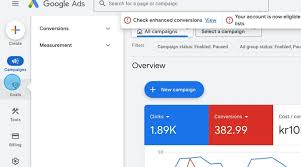Table of Contents
Running google ads for real estate isn’t about throwing money into a campaign and hoping for leads. It’s about targeting precisely, crafting persuasive messaging, and tracking real value. In real estate, where each lead is high-value, optimization matters more than spending.
Below is a step-by-step playbook to help you set up, refine, and scale Google Ads campaigns that actually deliver.

Understand Search Intent Before Choosing Keywords
People search for real estate properties with different mindsets. Someone typing “3 BHK in Andheri” might just be window-shopping, while someone entering “2 BHK for sale near Andheri station” is actively looking.
Group your keywords by intent:
-
- Transactional / High intent: “Buy 2 BHK in Andheri”, “Apartment price in Borivali”
-
- Navigational / Project-specific: “Ocean View Towers brochure”, “Project XYZ site map”
-
- Informational / Research: “Upcoming real estate projects in Mumbai 2026”, “Home loan interest rates Pune”
Then, for each keyword group, send searchers to matching landing pages. Don’t force someone in research mode into a “Book Now” page—guide them with content and options.
This strategy ensures your google ads for real estate budget is used smartly, attracting people with higher chances of conversion.
Narrow Your Geographic Targeting
One of the biggest wastes in real estate advertising is showing ads to people far from your property location. Use Google’s geographic tools to pinpoint your ideal audience:
-
- Target by city, postal/zip codes, or radius around the property
-
- Use custom shapes / map-based targeting to include only target zones
-
- Exclude areas where you don’t want your ads to appear
To boost local credibility, activate location extensions so your ad shows an address or map pin. This reassures users: “Yes, this is relevant to my area.”
When using google ads for real estate, effective geo-targeting ensures your ads reach people who could actually visit or buy your property.
Write Ads That Speak to Real Buyers
Many real estate ads sound generic: “Luxury flats for sale”. That’s vague. To cut through the noise, your ad copy must:
-
- Pinpoint benefits: “Ready-to-move 3 BHK”, “Zero GST till Q4”
-
- Create urgency: “Only 2 units left”, “Offer ends June 30”
-
- Offer incentives: “Book now, get modular kitchen free”
-
- Tailor to audience profile: “Perfect for first-time buyers”, “Ideal for IT professionals near Hinjewadi”
-
- Use words your target audience uses, not marketing buzzwords
For example:
“3 BHK, 5 mins from Metro — No GST + Free Club Membership. Only 3 units left. Enquire Now.”
Every phrase should meet a real person’s needs, fears, or goals—because that’s how you make google ads for real estate work.
Create Focused, Conversion-Driven Landing Pages
Even the best ad can fail if the landing page is weak. Here’s what your landing page must do:
-
- Load quickly (prefer mobile speed over fancy visuals)
-
- Be mobile-responsive (most users will come via phone)
-
- Show clear images / floor plans / site layouts
-
- Present important data (price, EMIs, amenities)
-
- Use a single, strong call-to-action — don’t confuse users with multiple buttons
-
- Include instant contact options: click-to-call, WhatsApp, enquiry forms
Also, align each landing page with the specific ad group. If an ad speaks about “3 BHK near Lakeside”, the landing page should continue that thread—not show random properties across the city.
By marrying your ad and landing experience, you maximize the ROI from google ads for real estate.
Use Ad Extensions to Expand Presence (for Free)
Extensions are extra elements Google allows you to add to ads without extra cost. They make your ad bigger, more informative, more clickable. Use:
-
- Call Extensions: Show your phone number
-
- Sitelink Extensions: Link to floor plans, amenities, FAQ, gallery
-
- Callout Extensions: Add short trust phrases like “RERA Approved”, “Loan Assistance”
-
- Structured Snippets: Highlight features (“Pool, Gym, Clubhouse”)
These extensions enhance your ad’s real estate presence and improve click-through rates—important when focusing on google ads for real estate.
Run Multiple Ad Variants — Then Weed Out Weak Ones
Don’t rely on one ad per group. Test 3–5 different ideas:
-
- Alternate headlines
-
- Different descriptions
-
- Variations in CTAs
-
- Even different tones (emotional vs. rational)
Track these metrics:
-
- Click-through rate (CTR)
-
- Conversion rate
-
- Bounce rate
-
- Time on page
Pause ads that underperform and scale those that work. Let data—not guesswork—guide your optimization of google ads for real estate.
Track Real Conversions, Not Just Clicks
Clicks don’t pay your bills—leads do. For real estate, meaningful actions include:
-
- Form submissions
-
- Phone calls (with call tracking and duration thresholds)
-
- WhatsApp / Messenger messages
-
- Brochure downloads, virtual tour clicks
Use tools like Google Tag Manager or conversion tracking in Google Ads to capture these events. If you only track clicks, you’ll never see which campaigns are truly profitable.
Tracking these properly ensures your google ads for real estate campaigns focus on what drives value.
Retarget Users Who Didn’t Convert (Yet)
Most visitors don’t convert on their first visit. That’s okay. Use remarketing to bring warm leads back:
-
- Target users who viewed project pages but didn’t inquire
-
- People who downloaded a brochure but stopped before the final step
-
- Visitors who haven’t returned in 30+ days
Serve them fresh ads — updated offers, walkthrough videos, limited-time deals, new phases. Stay top-of-mind without being pushy.
When done right, remarketing is a crucial part of google ads for real estate success.
Allocate Budget Smartly by Funnel Stage
Don’t spread your budget evenly. Match spend with intent:
-
- Awareness / Top of Funnel: Use display or video ads with lower bids
-
- Middle Funnel / Consideration: Target specific keywords with moderate bids
-
- Bottom Funnel / Conversion: Use retargeting + high-intent search terms with higher bids
By layering campaigns, you move prospective buyers from curiosity to action while maintaining control over spend.
This wise allocation ensures your google ads for real estate budget works efficiently.
Continuously Analyze, Refine & Scale
Successful campaigns evolve. Regularly:
-
- Check which keywords or ads are underperforming
-
- Pause or replace them
-
- Redistribute budget to better performers
-
- Test new ad copies or extensions
-
- Expand to similar neighborhoods or audiences
Small consistent improvements compound over time. The campaigns that keep evolving are the ones that deliver consistent returns with google ads for real estate.
Final Thoughts
Optimizing google ads for real estate is about accuracy, not extravagance. Focus on:
-
- Intent-based targeting
-
- Local reach
-
- Ads that speak like real humans
-
- Custom landing pages
-
- Conversion tracking
-
- Smart remarketing
-
- Funnel-based budgeting
You don’t need a huge budget. You need a strategy, discipline, and a willingness to test. Agencies or developers that treat Google Ads as a performance machine—not just a visibility tool—are the ones winning deals faster.
FAQs
1. Do Google Ads work in real estate?
Yes. When you target keywords with real intent and present relevant offers, google ads for real estate can deliver high-quality leads from people actively looking for properties.
2. What budget to start with?
There’s no universal figure. Begin modestly with focused campaigns, measure performance, then scale. Smart targeting often beats large budgets.
3. Should each project have its own landing page?
Absolutely. Tailored pages increase relevancy, reduce bounce rates, and improve conversions.
4. Display vs. Search campaigns
Both have roles. Use display or video ads for awareness; use search campaigns for people actively looking. Adjust spend according to where your leads come from.
5. How do I increase lead quality?
Use narrow geo-targeting, write ads based on intent, refine landing pages, and track real conversions. That’s how you elevate google ads for real estate results.


